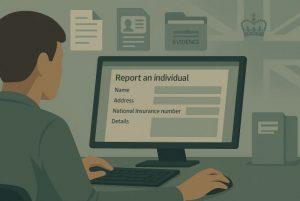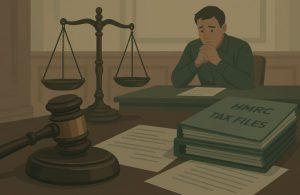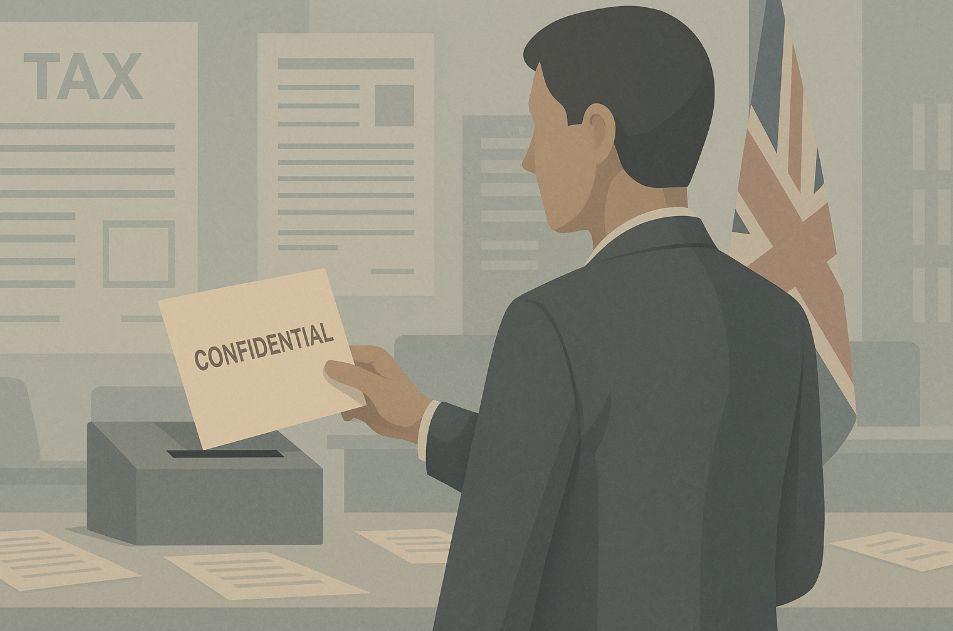Tax compliance is the backbone of a fair and functional society. In the UK, individuals or businesses that deliberately avoid paying their taxes commit a serious offence known as tax evasion. HMRC offers secure, anonymous ways for anyone to report such activities. This guide explains how to report tax evasion in the UK, what to expect after reporting, and why it matters.
What is Tax Evasion in the UK?

Tax evasion is the illegal act of deliberately avoiding paying taxes owed to HMRC (His Majesty’s Revenue and Customs). It occurs when individuals or businesses misrepresent their income, expenses, or assets to reduce their tax liability. Unlike tax avoidance, which exploits legal loopholes, tax evasion is a criminal offence punishable by fines, prosecution, and even imprisonment.
In the UK, billions of pounds are lost annually due to tax evasion. This significantly undermines public services like healthcare, education, and infrastructure development. HMRC treats tax evasion with the utmost seriousness and operates a robust system for investigating suspected cases.
Some common forms of tax evasion include:
- Failing to declare income from freelance work or side hustles
- Underreporting business revenue
- Paying workers “cash in hand” without PAYE records
- Operating unregistered businesses or using false invoices
Who Can Report Tax Evasion to HMRC?
Anyone in the UK including employees, customers, neighbours, or business partners can report suspected tax evasion. There’s no requirement to be directly affected by the fraud to submit a report. The HMRC encourages public involvement in identifying dishonest tax behaviour, and the whistleblower’s role is seen as a civic duty.
A person does not need to present solid proof like bank records or invoices to report. HMRC investigates based on patterns, tips, and internal audits. However, providing specific and factual information increases the likelihood of a successful investigation.
How Can Someone Anonymously Report Tax Fraud or Evasion to HMRC?
HMRC allows individuals to report tax fraud confidentially and anonymously through several channels:
1. HMRC Online Form
The most efficient way is via the official HMRC Online Reporting Form. This secure portal allows users to submit information about the individual or business involved, the type of suspected fraud, and any supporting details.
2. Tax Evasion Hotline
HMRC also operates a dedicated tax fraud hotline at 0800 788 887, which is open Monday to Friday, 8am to 6pm. Callers are not required to give their names or contact details.
3. Report by Post
Alternatively, reports can be submitted by post to:
HM Revenue and Customs
Fraud Hotline
Cardiff CF14 5ZN
United Kingdom
This option is useful for those who wish to remain completely off the digital radar.
What Information Does HMRC Require When Reporting Someone?

To aid their investigation, HMRC asks for as much specific information as possible. The more accurate and comprehensive the report, the easier it is for them to validate claims.
Details that help HMRC include:
| Information Type | Examples |
| Personal or business details | Name, address, phone number, company name |
| Nature of tax evasion | Not declaring income, cash-in-hand jobs |
| Timeframe | When the evasion started and how long it lasted |
| Supporting evidence | Documents, emails, social media ads |
| How you became aware | First-hand experience or word of mouth |
It’s not mandatory to provide all this information, but it increases the likelihood of a successful follow-up.
What Happens After You Report Tax Evasion to HMRC?
After receiving a report, HMRC conducts an internal risk assessment. This process involves analysing data, checking prior records, and potentially launching a formal investigation through their Fraud Investigation Service (FIS).
In most cases:
- The person reporting won’t receive updates due to confidentiality.
- The subject of the report won’t know who reported them.
- Investigations may take several months depending on complexity.
HMRC uses advanced data-matching software, cross-references with banks, and tips from other sources to validate claims before taking further legal action.
Can You Report Cash-in-hand Work or Self-employed Tax Evaders?
Yes, cash-in-hand work is one of the most commonly reported forms of tax evasion. It becomes illegal when the income is not declared or when employers fail to deduct taxes and National Insurance contributions.
Self-employed individuals are legally required to register with HMRC, file a Self Assessment tax return, and pay taxes due. Reporting a self-employed person who operates outside these legal requirements is fully supported by HMRC’s fraud reporting tools.
Common scenarios include:
- Tradespeople accepting cash but not issuing receipts
- Freelancers not declaring income from multiple platforms
- Gig economy workers under-reporting digital earnings
What Penalties Can Tax Evaders Face in the UK?

HMRC imposes a wide range of penalties depending on the nature and severity of the fraud:
| Type of Penalty | Description |
| Civil Penalties | Fines of up to 100% of the unpaid tax (plus interest) |
| Criminal Charges | Prosecution, fines, and imprisonment up to 7 years |
| Asset Seizure | Confiscation of property under the Proceeds of Crime Act |
| Loss of Licence | Business closure or loss of operating licence |
In addition, tax evaders may suffer long-term reputational damage and face bans from being company directors.
What Protections Exist for HMRC Whistleblowers?
Whistleblowers who report tax evasion anonymously are protected under UK law. HMRC does not disclose the identity of informants, even if the report leads to a criminal trial.
While the UK does not currently offer financial incentives for whistleblowers (unlike the US), protections under the Public Interest Disclosure Act 1998 ensure safety from retaliation in employment or business relationships.
For those who fear repercussions, legal advice can be sought from organisations like Protect or the Citizens Advice Bureau.
Should You Report Someone for Tax Evasion?
Reporting someone for tax evasion isn’t always a straightforward decision. It can cause tension in families, communities, or workplaces. However, choosing to report plays a vital role in supporting fairness and equality in society.
Some people hesitate, worrying they may have misunderstood the situation or might be accused of false reporting. It’s important to understand that reporting is not a legal claim HMRC will independently verify any information provided. Malicious or knowingly false reports can, however, result in legal consequences.
How Does Tax Evasion Affect Public Services in the UK?

Every pound lost to tax fraud impacts public services directly. From underfunded schools to long NHS waiting lists, the effects ripple across society. It also creates an unfair playing field for honest taxpayers and businesses who follow the rules.
Some key effects include:
- Reduced funding for local councils
- Pressure on emergency services
- Less investment in national infrastructure
When individuals report tax evasion, they contribute to building a transparent and functional society.
How Does HMRC Detect Tax Evasion Without Public Reports?
While public reports are a crucial source of information, HMRC doesn’t solely rely on whistleblowers to detect tax fraud. They use advanced data analytics and cross-referencing systems to identify suspicious activity across financial records, bank transactions, payroll systems, and even social media platforms.
HMRC’s powerful Connect System can:
- Analyse over a billion data points daily
- Match income reports with spending habits
- Cross-check third-party information (from banks, employers, and other agencies)
For example, if someone claims minimal income on their tax return but is seen flaunting luxury items or posting about lavish holidays online, HMRC may flag their account for review. Similarly, discrepancies between employer PAYE filings and employee tax returns often lead to compliance checks.
This proactive surveillance system ensures that even if a tip-off isn’t received, dishonest taxpayers are still at risk of being caught.
Can Businesses Be Reported for VAT or Payroll Fraud?
Yes, businesses committing VAT fraud, payroll fraud, or falsifying records can be reported directly to HMRC. These are among the most commonly investigated offences, particularly in sectors like hospitality, construction, and retail where cash transactions and subcontracting are frequent.
VAT fraud can include:
- Not registering for VAT when required
- Charging VAT but not remitting it to HMRC
- Creating fake invoices to reclaim VAT fraudulently
Payroll fraud might involve:
- Underreporting employee wages to reduce PAYE or National Insurance
- Paying workers off the books to avoid tax liabilities
- Claiming false furlough or wage subsidy payments (as seen during the COVID-19 pandemic)
If someone suspects a business is engaging in these illegal activities, they can report it via the HMRC fraud hotline or online form. HMRC treats such reports seriously and conducts detailed audits, often spanning several months.
These types of fraud hurt both the economy and law-abiding businesses, making it critical for citizens and competitors alike to act responsibly.
Conclusion
Tax evasion is not a victimless crime. It affects everyone from taxpayers to vulnerable communities relying on public services. HMRC has made the reporting process simple, anonymous, and secure to encourage civic responsibility.
By submitting accurate and honest reports, citizens play a critical role in ensuring everyone pays their fair share, and that those who cheat the system are held accountable. In the long term, this contributes to a stronger, more ethical economy for the UK.
FAQs
Can I get paid for reporting tax fraud to HMRC?
No, HMRC does not offer monetary rewards for whistleblowing. Unlike some countries, the UK focuses on civic responsibility rather than financial incentives.
What’s the difference between tax fraud and benefit fraud?
Tax fraud involves underreporting or not paying taxes, while benefit fraud is about receiving welfare payments you’re not entitled to. Both are criminal offences but investigated by different departments.
Can HMRC track unreported cash transactions?
Yes, HMRC uses digital footprints, banking records, and third-party data to trace undeclared income, including cash dealings.
Is there a time limit for reporting past tax evasion?
While there’s no official deadline, HMRC can investigate historical fraud going back 20 years in severe cases.
Will HMRC contact me after I report someone?
If the report is made anonymously, you will not be contacted. If you provide contact details, HMRC may reach out for more information, but they’ll still protect your identity.
Can I retract a report made to HMRC?
Once submitted, reports cannot be retracted. However, if you believe you made an error, you can clarify via another report.
How do I report a business not issuing receipts?
You can report the business via the HMRC tax fraud hotline or online form by describing the situation and providing business details.









Leave feedback about this